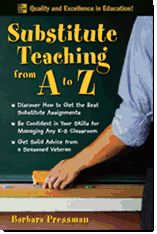|
 |
| Teachers.Net Gazette Vol.6 No.5 | May 2009 |
Subscribe for free home delivery |
|
Help! Too Much Talk! Not Enough Work! Barbara helps substitutes get students’ attention back after open discussion and provides tips for keeping middle and high school students engaged when it appears their teacher has left too little work. | |
|
Dear Barbara - Advice for Substitute Teachers by Barbara Pressman The author of Substitute Teaching from A to Z (McGraw-Hill, 2008) Regular contributor to the Gazette May 1, 2009 |
|
 Dear Barbara, I am relatively new at subbing, and I find that for the most part subbing days are great with the exception of talking. There are times when I want an open exchange of communication, and other times I don't. How do I let students (who I’ve only known for a few hours) know when it is OK to have class discussion? Secondly, how do I get the class back to me once the open exchange is over? I feel frustrated, as the students are excited about our discussion, yet I need to move into direct teaching. Just to note, I have tried attention getters such as ringing a bell clapping in unison, saying "class, class" they repeat, "yes, yes" and finger signs. I have even written silently on the board, "I need your attention, close your lips and listen." It's rather exhausting trying throughout the day to get the students back on track. I don't want to discourage their interactive time either, as I love this time with them. Any suggestions would be greatly appreciated. Thank you for your time and attention to this matter. Sincerely, Dear Wendy, All good teachers want students to have a healthy exchange of ideas. That’s what effective teaching is all about. If you structure your discussion properly, it will be easier to end it smoothly. Begin by reviewing rules, such as: only one person talks at a time, hand up or you won’t be called on, respect for all ideas. Now you have set the tone. Call on the first student, reflect on his/her comment, and use praise to encourage more sharing of ideas. When you sense that it’s time to move on, say that you’ll call on one last person. If anyone would like to add more to the discussion, say that you will walk around the room during independent work and listen to their thoughts. If the discussion was really worthwhile, a reward for finishing work early would be to continue discussion at the end of class. Here are some helpful ways to get attention when students are talking:
| |
|



